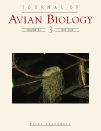 Evolutionary and conservation biologists in Spain are retracting two articles – one from the Journal of Avian Biology and the other from Ardeola – because they discovered a fatal flaw in their analysis.
Evolutionary and conservation biologists in Spain are retracting two articles – one from the Journal of Avian Biology and the other from Ardeola – because they discovered a fatal flaw in their analysis.
The Journal of Avian Biology article, “Are European birds leaving traditional wintering grounds in the Mediterranean?” aimed to determine whether the abundance of passerines had decreased in recent decades, but failed to control for birds that may have gotten killed by hunters. Although it was published in January, we can only find an abstract from its acceptance by the journal in November 2014.
The authors detail the saga of their error in the retraction notice:
The above article, published online on 20 January 2015 in Wiley Online Library (wileyonlinelibrary.com), has been retracted by agreement between the authors, the journal Editors in Chief, Thomas Alerstam and Jan-Åke Nilsson, the Nordic Society Oikos and John Wiley and Sons Ltd.
The aim of this study was to answer the question, ‘Are European birds leaving traditional wintering grounds in the Mediterranean?’ Due to an analytical error the study only analysed EURING circumstance 20 ring records (see the EURING exchange code) which excludes birds hunted by shot and other ways, but not all hunted individuals. As a result, the effect of illegal hunting on ring recoveries was not controlled for in the analyses. This means that the data is affected by ring records from birds other than ‘alive and probably healthy and released by ringer’ (condition 8 in the EURING exchange code). The authors’ intention always was to include both condition 8 and circumstance 20, but unfortunately this was not the case.
When the data was reanalysed including both condition 8 and circumstance 20 recoveries, there is no longer any support for the main conclusion of the paper and the authors can only conclude that winter ring recoveries in Spain of some common passerines (robin, chiffchaff and blackcap) do not decrease.
The authors apologise for this mistake and hope that the retraction will serve to prevent the spread of the unsound conclusions derived from this paper.
The Ardeola retraction is equally detailed. (We can’t help but notice, however, that the original report, “Has the Number of European Robins Erithacus rubecula Wintering in Spain Decreased?” has not yet been marked as retracted by that journal.)
The studies have not yet been cited, according to Thomson Scientific’s Web of Knowledge.
In response to our request for comment, José Luis Tellería, the paper’s corresponding author, forwarded us the email he sent to his colleagues as soon as he detected the problem, as well as the explanations he sent the two journals. In his note to us, he added:
In addition, I put the retractions in my account in ResearchGATE. This has been the worst moment of my scientific career. In both cases (Ardeola and Journal of Avian Biology), I must thank the friendly and constructive behavior of the editors.
We have also reached out to the editors-in-chief of both journal and will update if they reply.
Hat tip: John Hutchinson
Seeing retractions on a daily basis, we tend to become a little blase about their existence. Yet, it is only when we hear the opinions of seasoned professors who encounter one (or two) retractions for the first time in their career, do we realize what a rough impact it has on their psyche.
This is a nice retraction to have in mind when the question of whether a retraction should in and of itself be enough to trigger a punishment such as having to repay grants.
They made a mistake; reviewers didn’t catch it; someone else (who?) did; the article got retracted.
Not a trace of fraud, nefarious image manipulation, text lifted from somewhere else.
M Welinder, the phenomenon you are referring to, in plain English, is post-publication peer review (PPPR)*, where the power of detection lies in the hands of the average scientist, beyond the confines of control of the publisher. Until PPPR becoes embraced by the community (authors, editors and publishers) as an essential part of the publishing process, then publishing will remain porous, incomplete, biased and otherwise problematic.
My ideas on this in the ref below, and references therein.
Teixeira da Silva, J.A. (2015) Debunking post-publication peer review. International Journal of Education and Information Technology (Public Science Framework) 1(2): 34-37. http://files.aiscience.org/journal/article/html/70390007.html